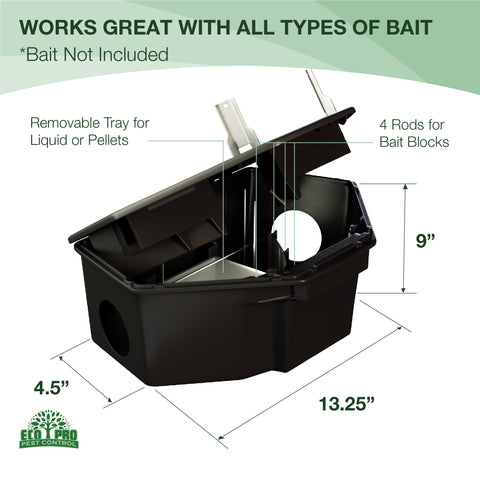Liquid Bait, Pellet Bait and Bait Blocks, What is the Difference?
Posted by Michael Koski on
If you are experiencing problems with rodents, maybe you have started searching online for DIY pest control solutions. With thousands of pages of search results on rodent behavior, poisons, baits, traps… it may seem like you’ve opened Pandora’s box. It may help to focus on just one topic to keep from being overwhelmed. Here, we will discuss this question: which baits are best, and how do you use them? This brief discussion of three types of rodent bait will hopefully demystify the process and help you choose the right kind of bait to resolve your rodent problems.

Pick your Poison
Liquid bait is a highly concentrated toxin that comes in fluid form. It is designed to be dissolved in water and used in one of two ways: 1) to soak food materials that you will leave out for rodents, such as fruits, nuts, vegetables, etc; or 2) as a water source for rodents to drink from directly. Most liquid baits have ammonia or an anticoagulant such as diphacinone as the active ingredient. When ingested, these chemicals will cause internal bleeding and other complications that will lead to the rodent’s death.
Are they effective? Yes, but there are a few considerations. For example, did you know that mice do not need a reliable source of water to survive? They can get along just fine if their food sources are adequately moist. If you are combatting mice and are thinking of using liquid bait, soaking food material such as dried fruit in bait/water solution may be the most effective. Rats, on the other hand, do need a consistent fresh water source. A solution of liquid bait and water could be placed near rat travel routes to become their source of water, but this is most effective in dry, arid conditions without other water sources available.
Pellet Bait are small capsules of a food material mixed with rodenticide. The food material is usually a grain such as wheat or corn, mixed with peanut butter or other oily substance. Most often, they are used in bait stations, which are small containers that allow rodents inside to eat the bait placed in them. These tamper-proof bait stations, such as the ones sold by Eco-Pro Pest Control, prevent accidental poisoning of children or pets.

Are they effective? Pellet bait does have some advantages, one of which is that they are multiple or continuous feeding baits. This means that they are slower acting, allowing the rodents to feed for a few days before succumbing to the poison. Why would slower be better? Rats in particular are clever and cautious. It usually takes several days before they will even approach a new food material, and when they finally do, they will take small nibbles until they believe it won’t harm them. This also gives the green light to the rest of the rats to try out this new food source. As they ingest the pellets over time, they will slowly succumb to the poison before figuring out that the food is the source.
Bait blocks are similar in form and use to pellet bait. Like pellet bait, they are made with food materials that are attractive to rodents, such as peanut butter or fruit. Unlike pellets, they are compressed into small cubes. They are safest when placed in bait stations, as curious pets or children may accidentally ingest them if they are left in the open.
Are they effective? Yes. Although, like all other baits, rats in particular will be cautious about the blocks for a few days, they will eventually start to nibble. Often, they will break off chunks to take back to their nesting area, spreading it among the other rodents in their nest. Most rodents do not venture very far from their nests, so for the best effectiveness, place bait stations against walls or known travel routes.
Hopefully this brief analysis has helped to answer some questions you may be having about bait. If you’re battling with rodents, you don’t have to feel alone. Knowing what you can do to combat the issue will empower you to take the issue head on and solve your rodent problem!
Share this post
- Tags: bait, bait station, best bait, mice, mouse, mouse bait, pest control, pests, poison, rat, rat bait, rats
